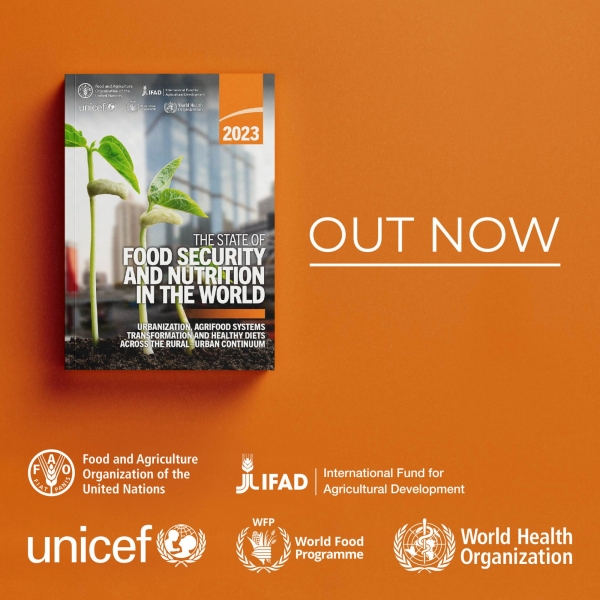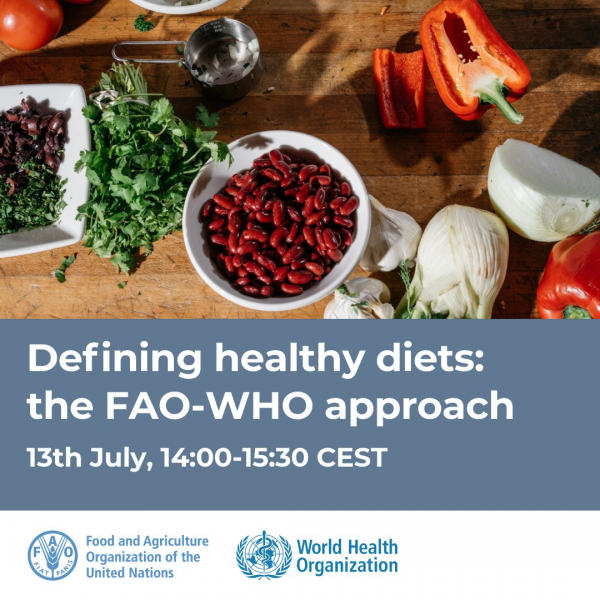International agencies launch publications relating to obesity and childhood health
Over the past month, great strides have been made by international agencies such as WHO, UNICEF and FAO in supporting the implementation of evidence-based policies relating to obesity and children's health.
These address the following issues:
- ensuring access to nutritional diets
- protecting children from harmful marketing practices
- restricting commercial influences which accelerate obesity
- reaffirming children’s rights to health.
- applying the concept of a healthy diet to local contexts
The 2023 State of Food Insecurity and Nutrition in the World report was launched
The new SOFI report states that the capacity of people to access healthy diets has deteriorated globally. More than 3.1 billion people across the planet - or 42% - were unable to afford a healthy diet in 2021. This represents an overall increase of 134 million people compared to 2019.
WHO states that over 8 million lives every year could be saved by the adoption of a healthy diet. Governments and commercial partners must rally to make reality of these policy recommendations to tackle the contextual factors influencing rising obesity and NCDs, and to protect population health.
SOFI Report


WHO policy guideline strengthens action on food marketing aimed at children
WHO released new guidelines on comprehensive mandatory policies to protect children of all ages from the marketing of foods and non-alcoholic beverages that are high in saturated fatty acids, trans-fatty acids, free sugars and/or salt (HFSS). These recommendations are published more than 10 years after Member States endorsed WHO’s recommendations on the marketing of foods and non-alcoholic beverages to children. They build on recent evidence to understand how exposure to, and the power of, food marketing affects children’s health, eating behaviours, and food-related attitudes and beliefs.
WHO recommends mandatory regulation of marketing of HFSS foods and non-alcoholic beverages having previously made more allowances for a range of policy approaches.
Download new WHO guideline
WHO & UNICEF publication on protecting children from harmful food marketing
This joint UNICEF and WHO toolkit is aimed at assisting governments and partners in implementing policies which protect children from harmful impacts of food marketing. It takes a child-rights based approach, and examines commercial practices such as ubiquitous advertising of unhealthy products aimed at both children and caregivers. Few countries have adopted and implemented the comprehensive regulations needed to protect children from these practices. Globally, overweight affects 1 in 5 children 5–19 years of age.
The document aims to guide and provide evidence on how best to limit commercial influences that undermine a child’s right to good nutrition. This toolkit complements WHO’s recent Guideline on Policies to protect children from the harmful impact of food marketing.
WHO-UNICEF Toolkit


Defining healthy diets: the FAO-WHO approach
A launch event was held on 13 July to publicise the development of WHO healthy diet guidelines and update of the FAO-WHO concept of healthy diets.
Since 2003, recommendations on healthy diets have been evolving and methodologies to develop guidelines adapted to account for all forms of malnutrition and diet-related NCDs. FAO and WHO are updating their concept of healthy diets to reflect the latest scientific evidence for the relationship between diet and human health, but also recognise the intricate linkages between human and planetary health through sustainable agrifood systems.
View the launch event, and find more information about this update here.
Download Launch event
What is a healthy diet?
WHO states that “healthy diets should be supporting the highest level of health”, not just the absence of disease, and should “allow healthy growth and development, support all bodily functions, enable adequate levels of activity, prevent noncommunicable diseases, prevent foodborne disease and promote wellbeing at all stages of the life course”. The core principles of a healthy diet include adequacy of energy and essential nutrients, balance among the 3 main sources of energy, diversity of foods and food groups, and moderation in consumption of foods and dietary components associated with health risks.
Underpinning the updated FAO-WHO definition of healthy diets are the WHO healthy diet guidelines which provide evidence-informed recommendations on diet. The latest addition to the suite of WHO healthy diet guidelines cover carbohydrates, total fat, saturated fatty acids and trans-fatty acids, which complement existing WHO guidelines on free sugars and sodium intake, as well as the recently released guideline on use of non-sugar sweeteners. FAO announced that 'Food systems-based dietary guidelines' are currently under development.
Our Policy Priorities
Have a look at our website to learn about the policy and advocacy work that we are doing to reduce, prevent and treat obesity.
Policy and Advocacy